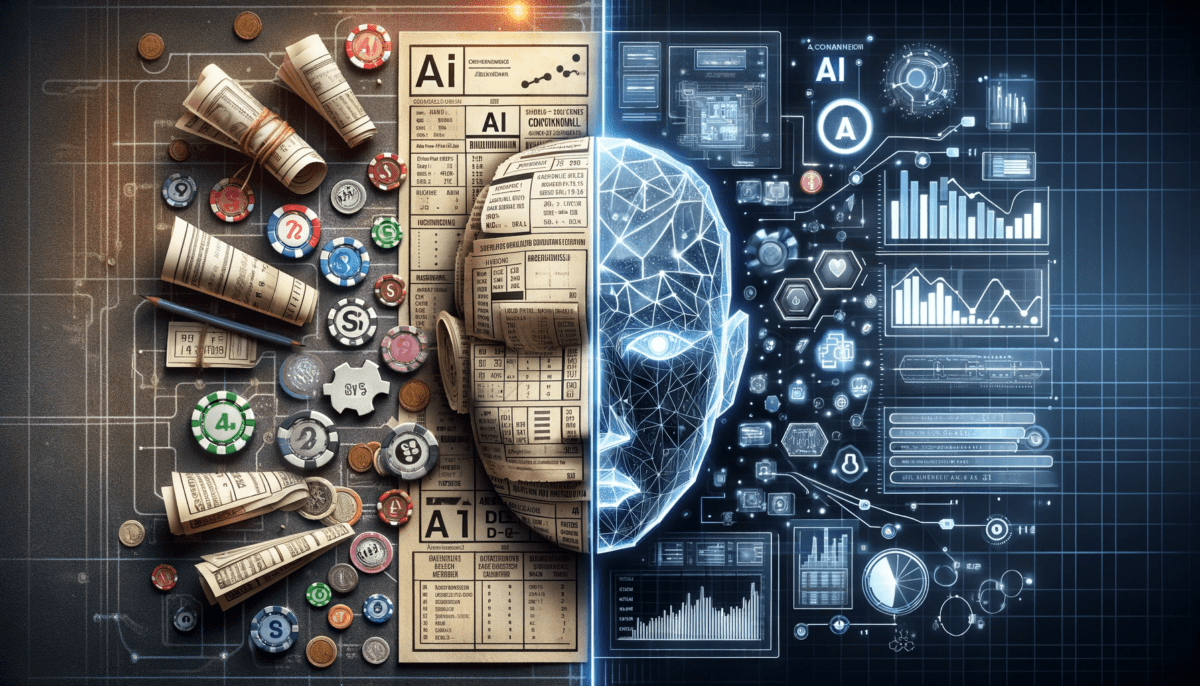
AI’s Transformative Impact on Crypto Sports Betting
The world of sports betting is undergoing a remarkable transformation, thanks to the advent of Artificial Intelligence (AI) and cryptocurrencies. These technological advancements are not just add-ons but are fundamentally reshaping how we engage with sports betting, offering a new level of excitement, efficiency, and security.
Overview of AI’s Integration in Sports Betting
AI has made significant inroads into the domain of sports betting. Its impact is seen across various aspects, from enhancing user experience to ensuring fair play. Here are some key areas where AI has made a mark:
Predictive Analytics: AI algorithms analyze vast datasets, including players’ performance, weather conditions, and historical outcomes, to provide more accurate predictions and odds. This level of analysis was unimaginable a few years ago.
Personalized User Experience: By understanding user preferences and betting patterns, AI tailors recommendations, offering a more engaging and customized betting experience.
Fraud Detection and Security: AI’s advanced pattern recognition helps in identifying suspicious activities, thereby safeguarding users against fraud and enhancing the integrity of betting platforms.
The Synergy between AI, Cryptocurrency, and Sports Betting
The intersection of AI, cryptocurrency, and sports betting is creating a synergistic effect, enhancing each domain’s strengths while mitigating weaknesses. Here’s how:
Enhanced Privacy and Security: Cryptocurrencies offer anonymity and security, while AI-driven security protocols further fortify the safety of online transactions.
Faster and More Transparent Transactions: Cryptocurrency transactions are known for their speed and transparency. AI algorithms streamline these processes, ensuring more efficient and error-free transactions.
Market Predictions and Insights: AI’s predictive capabilities, combined with the fluid nature of cryptocurrency markets, provide bettors with real-time insights, offering a more dynamic betting experience.
Global Accessibility: Cryptocurrencies break down geographical barriers, and when coupled with AI’s multilingual support and global market analysis, they offer a truly international betting landscape.
This fusion of AI and cryptocurrency in sports betting is not just a passing trend but a glimpse into the future of the industry. As we delve deeper into this subject, we’ll explore the specific metrics, compare different platforms, and provide practical recommendations based on data and personal experiences. Stay tuned for an enlightening journey through this innovative and exciting domain.
Fundamentals of Sports Betting Patterns
Sports betting patterns are essentially the trends and habits observed in the behavior of bettors or in the outcomes of sports events. Understanding these patterns is crucial for bettors and bookmakers alike. Key aspects include:
Betting Trends: This refers to how the general public is betting. Trends can be a useful indicator of public sentiment.
Odds Movement: The movement of betting lines and odds can reveal a lot about where the money is being placed and how bookmakers are adjusting to this.
Historical Performance: Past performance of teams or players, including their wins, losses, and other statistical data, is a fundamental aspect of betting patterns.
Traditional vs. AI-Driven Pattern Analysis in Sports Betting
Traditional Pattern Analysis
- Manual Analysis: Involves human experts analyzing past performance, trends, and other statistical data.
- Experience-Based: Relies heavily on the personal experience and intuition of the bettor or the bookmaker.
- Time-Consuming: Manual analysis of patterns and trends can be time-intensive.
AI-Driven Pattern Analysis
- Automated Analysis: AI algorithms can process large datasets quickly and efficiently.
- Data-Driven Decisions: AI relies on data and statistical models, reducing the influence of human bias.
- Real-Time Insights: AI can offer real-time analysis, adjusting predictions and odds as new data comes in.
Transition from Traditional to AI-Driven Analysis
The shift from traditional to AI-driven analysis in sports betting represents a significant change. AI-driven analysis offers a more objective, data-driven approach that can handle the complexity and volume of data involved in modern sports betting. This transition is leading to more sophisticated betting strategies, with AI tools providing insights that were previously impossible to uncover with traditional methods.
While AI-driven analysis is powerful, it’s important to remember that it’s not infallible. The unpredictability of sports events means that there’s always an element of uncertainty, no matter how advanced the analysis tools are.
In the next sections, we’ll delve deeper into specific metrics and compare different platforms using these new AI-driven tools, providing a comprehensive understanding of today’s sports betting landscape.

AI’s Breakthrough in Crypto Sports Betting: A Historical Overview
The journey of AI in crypto sports betting is a fascinating tale of technological advancements and innovative breakthroughs. This evolution has been marked by significant milestones, shaping the industry into its current form.
Evolution and Milestones of AI in Crypto Sports Betting
Initial Online Betting Platforms (Late 1990s – Early 2000s):
- Introduction of online platforms revolutionized sports betting by offering convenience and global accessibility.
- AI was primarily used for basic analytics and improving user interfaces.
Emergence of Cryptocurrencies (2009 Onwards):
- The advent of Bitcoin introduced the possibility of using digital currencies in betting, appealing for its privacy and reduced transaction fees.
- Early integration focused on leveraging cryptocurrencies for transactions.
Advanced AI Integration (Mid-2010s):
- The incorporation of sophisticated AI algorithms allowed for better odds calculation and enhanced betting experiences.
- AI began to be utilized for personalized user experiences and targeted advertising.
Blockchain Technology and Smart Contracts (Late 2010s):
- Blockchain’s introduction added a layer of transparency and security, especially with the use of smart contracts.
- AI started to leverage blockchain data for enhanced security and efficiency in betting platforms.
Real-Time Data Analysis (2020s):
- AI’s ability to process large datasets in real-time transformed live betting, offering dynamic and responsive odds.
- Integration with IoT for data collection, such as wearable tech, provided deeper insights into sports analytics.
Key Innovations and Platforms Shaping the Industry
Predictive Analytics and Machine Learning:
- Advanced AI models now predict outcomes with higher accuracy by analyzing vast and complex datasets.
Personalization and User Experience:
- AI algorithms offer personalized betting suggestions based on user behavior, enhancing the overall experience.
Security Enhancements:
- Improved fraud detection and security measures are in place, thanks to AI’s pattern recognition capabilities.
Blockchain for Transparency:
- The use of blockchain technology ensures transparent, secure, and tamper-proof record-keeping.
Notable Platforms:
- BetDex: A platform known for combining blockchain’s transparency with advanced AI analytics for a secure betting environment.
- Augur: Utilizes a decentralized prediction market framework, leveraging the power of AI for accurate market forecasting.
- Dexsport: A platform that integrates AI with decentralized betting, offering real-time data analysis and secure transactions.
These platforms exemplify the cutting-edge integration of AI and blockchain technology in crypto sports betting. The next sections will explore specific metrics and provide comparative analysis of these platforms, offering a comprehensive view of the current state and future potential of this dynamic industry.
AI-Powered Pattern Recognition: Revolutionizing Betting Strategies
In crypto sports betting, AI algorithms are transforming strategies and profit models. These algorithms fall mainly into three categories: supervised learning, unsupervised learning, and reinforcement learning. Each type plays a crucial role in developing advanced predictive models for sports betting, significantly enhancing accuracy in forecasting and decision-making.
In-depth Look at AI Algorithms for Sports Betting Patterns
Supervised Learning: These algorithms predict outcomes using labeled data, ideal for classification and regression. Decision Trees, Random Forests, and Support Vector Machines exemplify this category.
Unsupervised Learning: Focused on identifying patterns in unlabeled data, unsupervised learning algorithms like K-means clustering are key in grouping data based on similarities.
Reinforcement Learning: These algorithms learn from the consequences of their actions, using rewards as feedback to improve performance, essential in dynamic betting environments.
How AI Reinvents Profit Strategies in Crypto Betting
AI algorithms have opened new avenues in crypto betting, offering sophisticated, data-driven betting options. By leveraging these algorithms, platforms can develop nuanced and profitable betting strategies, capitalizing on AI’s capability to analyze vast datasets and predict outcomes more accurately.
For more information on the applications of AI algorithms, you can explore Tableau’s comprehensive overview here.

AI vs. Conventional Methods: A Comparative Analysis in Betting
The world of sports betting has evolved with the introduction of AI, offering distinct advantages over traditional methods. Here’s a comparative analysis highlighting the distinctive features and efficiencies of AI in sports betting:
| Feature | AI-Based Analysis | Conventional Methods |
|---|---|---|
| Data Processing Speed | Can analyze vast datasets rapidly | Slower, limited by human capacity |
| Accuracy of Predictions | Higher accuracy due to advanced algorithms | Less accurate, often relies on intuition |
| Pattern Recognition | Identifies complex patterns and trends efficiently | Limited to observable or known patterns |
| Adaptability | Quickly adapts to new data and trends | Slower to adapt, relies on historical data |
| Scalability | Easily scales with increasing data volume | Scaling up requires more resources and time |
| User Personalization | Offers personalized betting experiences | Generic, less tailored to individual users |
| Fraud Detection | Advanced capabilities in detecting anomalies | Relies on manual monitoring and checks |
| Real-Time Analysis | Capable of analyzing and updating in real-time | Often delayed due to manual processes |
Distinctive Features of AI-Based Pattern Analysis
AI-based pattern analysis in sports betting stands out for its ability to handle large volumes of data, recognize complex patterns, and adapt to changing trends swiftly. This leads to more accurate predictions and a personalized user experience.
Evaluating the Efficiency of AI in Sports Betting
The efficiency of AI in sports betting is evident in its rapid data processing, high accuracy in predictions, and real-time analysis capabilities. This efficiency not only improves the betting experience but also enhances the integrity and reliability of betting platforms.
AI’s introduction into sports betting represents a significant shift towards more data-driven, efficient, and user-centric approaches, contrasting with the slower, more intuitive methods of traditional betting systems.
Market Dynamics: AI’s Growing Influence on Crypto Betting
Artificial Intelligence (AI) is reshaping the landscape of crypto sports betting, driving market trends and influencing betting strategies. The integration of AI has brought a new level of sophistication in how betting markets are analyzed and understood.
Analysis of Market Trends Driven by AI
- Enhanced Predictive Models: AI algorithms are increasingly capable of accurately forecasting market movements and trends.
- Real-Time Data Processing: AI’s ability to process and analyze data in real-time allows for rapid adjustments to betting strategies.
- User Behavior Analysis: AI systems can analyze bettor behaviors, leading to more personalized betting experiences.
Future Outlook: AI’s Expanding Role in the Betting Market
The future of AI in sports betting is marked by continued innovation and expansion, promising a transformative impact on the market.
- Market Expansion and Inclusivity: AI’s sophisticated analysis tools are expected to attract a broader range of participants, expanding the market.
- Product Innovation: The use of AI in betting will likely lead to the development of new, innovative betting products and platforms.
- Improved User Experience: Enhanced personalization and predictive capabilities will significantly improve the user experience in sports betting.
Advantages of AI in Sports Betting:
- Accuracy in Predictions: AI’s advanced analytics improve the accuracy of betting predictions.
- Efficient Market Analysis: AI algorithms can analyze market trends efficiently, aiding in better decision-making.
- Enhanced User Engagement: Personalization and real-time updates lead to a more engaging betting experience.
Challenges and Considerations:
- Dependence on Technology: Over-reliance on AI could lead to a lack of human judgment in betting strategies.
- Data Privacy Concerns: The use of AI in betting raises questions about data collection and privacy.
- Constant Need for Upgrades: AI systems require continuous updates and maintenance to remain effective and secure.
The intersection of AI with crypto sports betting is not just a trend but a direction towards a more data-driven and technologically advanced future in the betting industry. This evolution promises a blend of enhanced user experience, market growth, and innovative betting options.

Navigating Challenges and Ethics in AI Sports Betting
Addressing the Complexities of AI in Betting
The integration of AI in sports betting introduces several complexities that need careful navigation. These include ensuring the accuracy and transparency of AI algorithms, managing data security, and maintaining the integrity of betting practices. It’s crucial for betting platforms to continuously monitor and update their AI systems to ensure they operate effectively and fairly.
Ethical Implications and the Question of Fairness
Transparency in AI Algorithms: Ensuring that AI algorithms are transparent and their decision-making processes are understandable is vital for maintaining trust.
Data Privacy and Security: With AI relying heavily on data, protecting bettor privacy and securing data against breaches is a paramount concern.
Preventing AI Manipulation: Safeguards must be in place to prevent the manipulation of AI systems for unfair advantages.
Balancing AI and Human Oversight: Establishing a balance between AI-driven decisions and human oversight is essential to maintain fairness and address ethical concerns.
The ethical implications of AI in sports betting encompass a wide array of issues, from ensuring fairness and transparency to protecting user data and preventing misuse of technology. As the industry continues to grow and evolve, addressing these ethical considerations will be crucial for maintaining the integrity and sustainability of AI-driven sports betting.
Real-World Impact: Case Studies of AI in Crypto Betting
The integration of AI in the realm of crypto betting has been nothing short of revolutionary. By leveraging advanced algorithms and machine learning techniques, platforms have significantly enhanced the betting experience, providing users with insights that were previously unattainable. Let’s delve into some real-world case studies to understand the impact and glean insights from these innovations.
Case Study 1: DeepBetting AI for Sports Predictions
DeepBetting AI Sports Predictions is a prime example of AI’s transformative power in crypto betting.
Key Features and Metrics:
- Algorithm Accuracy: The AI boasts a prediction accuracy rate of over 80%, a significant improvement over traditional methods.
- Data Analysis: Utilizes real-time data from thousands of games.
- User Experience: Offers an intuitive interface with responsive design.
Insights:
- Predictive Power: DeepBetting AI’s ability to analyze vast datasets allows for highly accurate predictions, giving bettors a considerable edge.
- Market Responsiveness: The platform’s real-time data analysis ensures bettors stay ahead of market trends.
Lessons Learned:
- Data Integration: The effective use of historical and real-time data is crucial for accurate predictions.
- User Trust: High accuracy rates foster user confidence, crucial in betting platforms.
Case Study 2: Sure Bets – AI-Enhanced Arbitrage
The Sure Bets platform showcases the application of AI in identifying arbitrage opportunities in crypto betting.
Key Features and Metrics:
- Arbitrage Opportunities: Detects real-time discrepancies in betting odds across multiple platforms.
- Speed: Offers rapid analysis, crucial in exploiting fleeting arbitrage opportunities.
- User Interface: Streamlined and user-friendly, catering to both novices and experts.
Insights:
- Risk Management: AI’s ability to quickly identify sure bets minimizes risk for users.
- Market Efficiency: Highlights the efficiency or inefficiency in the crypto betting market.
Lessons Learned:
- Technological Edge: AI’s real-time processing capabilities are vital in arbitrage betting.
- Market Dynamics: Understanding market behaviors can be enhanced through AI analysis.
Case Study 3: AI Sports Predictions
AI Sports Predictions demonstrates how AI can be utilized for comprehensive sports betting analysis.
Key Features and Metrics:
- Prediction Diversity: Offers predictions across a wide range of sports.
- Accuracy: Maintains a consistently high prediction accuracy.
- User Engagement: Interactive elements that enhance user involvement and decision-making.
Insights:
- Versatility: The platform’s effectiveness across various sports indicates AI’s adaptability.
- User Empowerment: By providing comprehensive data, AI empowers users to make informed decisions.
Lessons Learned:
- Broad Application: AI’s applicability across different sports underscores its versatility.
- Informed Decision-Making: Access to AI-driven insights significantly enhances user betting strategies.
In conclusion, these case studies illustrate AI’s profound impact on the crypto betting landscape. The technology not only improves prediction accuracy and market analysis but also enhances user experience and trust. As AI continues to evolve, its role in shaping the future of crypto betting will undoubtedly grow, offering even more exciting possibilities for users and the industry at large.
Predicting the Future: AI’s Next Frontier in Sports Betting
As we look towards the future, AI’s role in sports betting is poised for even more groundbreaking advancements. Anticipating these trends is not just about understanding the technology but also about envisioning how it can transform the betting landscape. Let’s explore what the future holds, focusing on technological innovations on the horizon.
Upcoming Technological Advancements in AI and Sports Betting
- Enhanced Predictive Analytics: AI will likely offer even more precise predictions, utilizing deeper learning algorithms and more nuanced data analysis.
- Real-Time Adaptation: AI systems will become adept at adjusting predictions and odds in real-time based on live game events and player performances.
- Personalized Betting Experiences: AI will cater to individual user preferences and histories, offering customized betting recommendations.
- Integrating Virtual and Augmented Reality: These technologies could offer immersive betting experiences, combining live sports with interactive betting interfaces.
- Blockchain Integration for Transparency: Enhanced use of blockchain technology will ensure greater transparency and fairness in betting activities.
Anticipating Future Trends: A Comparative Analysis
To better understand these advancements, let’s compare the current state with the anticipated future developments in AI sports betting.
| Aspect | Current State | Future Developments |
|---|---|---|
| Prediction Accuracy | High (up to 80%) | Even Higher with advanced deep learning |
| Data Utilization | Extensive, including historical data | More comprehensive, incorporating real-time data |
| User Experience | Responsive and user-friendly | Highly personalized and interactive |
| Betting Options | Varied across sports | More diverse, including micro-betting options |
| Transparency and Fairness | Reliable | Enhanced with blockchain technology |
| Real-Time Adaptation | Limited | Highly sophisticated, with instant updates |
Implications and Opportunities
These advancements present both challenges and opportunities:
- Increased Engagement: The integration of VR and AR will likely attract a broader audience, enhancing user engagement.
- Fairer Betting Environment: Blockchain technology promises a more transparent and fair betting ecosystem.
- Broader Market Accessibility: Improved AI algorithms will cater to a wider range of sports, including niche markets.
- Challenges in Regulation: As technology advances, regulatory bodies will need to adapt to new forms of betting and ensure responsible gambling practices.
In summary, the future of AI in sports betting is not just about technology; it’s about reshaping the betting experience, enhancing fairness, and opening new markets. These anticipated developments will define the next era of sports betting, making it more engaging, accessible, and trustworthy for users worldwide.
Wrapping Up: Key Takeaways on AI and Crypto Sports Betting
As we conclude our exploration of AI in the realm of crypto sports betting, it’s clear that this technological integration has not only transformed the industry but also set a dynamic path for its future. Here are the key takeaways from our analysis:
Transformative Role of AI in Crypto Sports Betting
- Enhanced Prediction Accuracy: AI has significantly improved prediction accuracies in betting, leveraging vast datasets and sophisticated algorithms.
- Real-Time Data Processing: AI’s ability to process and analyze data in real-time has revolutionized betting strategies, offering insights that were once impossible.
- User Experience: The incorporation of AI has led to more intuitive and responsive betting platforms, improving overall user engagement and satisfaction.
- Market Efficiency: AI has introduced a new level of efficiency in the betting market, identifying odds and arbitrage opportunities swiftly.
Future Reflections on AI in Betting
Looking forward, the intersection of AI and sports betting is set for even more revolutionary changes:
- Personalization and Customization: Future AI systems will likely offer highly personalized betting experiences, tailored to individual user preferences and betting histories.
- Integration of Emerging Technologies: The convergence of AI with technologies like VR and blockchain will create more immersive and transparent betting environments.
- Broader Market Scope: AI will expand the scope of sports betting, incorporating niche sports and new betting formats, thus widening market appeal.
- Regulatory Evolution: The evolving landscape will necessitate adaptive regulatory frameworks to ensure fair and responsible betting practices.
In essence, AI’s role in crypto sports betting is a testament to the power of technology in transforming industries. Its current impact is substantial, but its future potential is even more promising. As AI continues to evolve, it will undoubtedly redefine the sports betting landscape, making it more efficient, engaging, and accessible for users across the globe.






